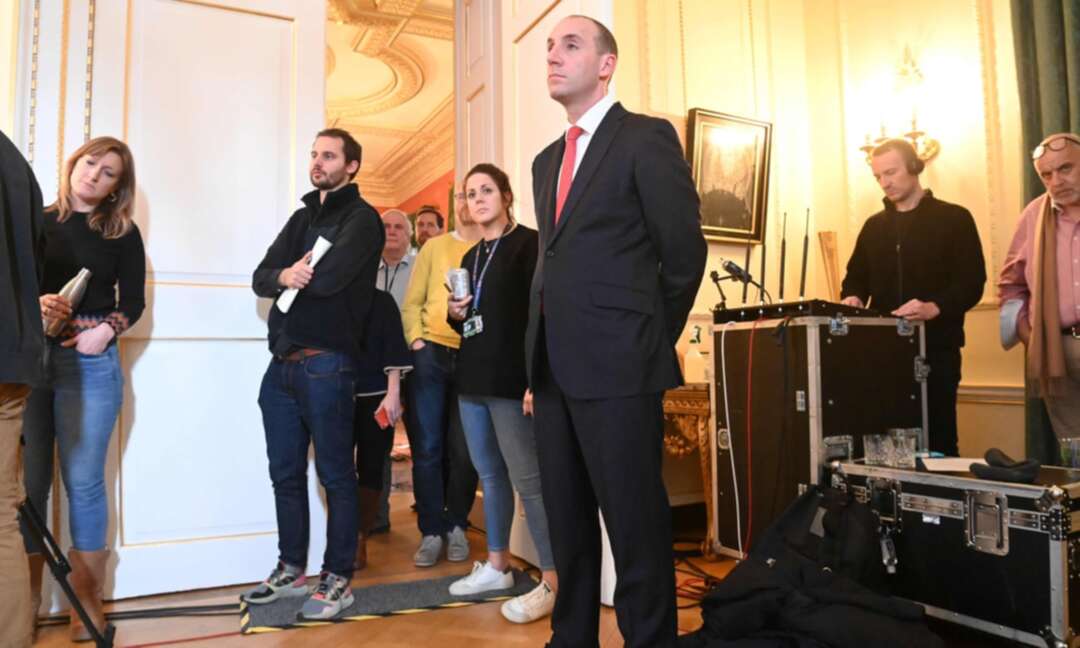-
New No 10 team take on Cummings' legacy of chaos and acrimony

Tories cautiously optimistic about Dan Rosenfield and Allegra Stratton, who want to press reset on PM’s tenure
Asubtle signal was sent across Whitehall last week when Tom Scholar, once identified by aides loyal to Dominic Cummings as on the notorious “shit list” of senior civil servants, was reappointed as permanent secretary to the Treasury.
It appeared that the war once waged against opinionated mandarins was over, and the threats of a revolution had left the building with Boris Johnson’s senior aide.
The prime minister now has a new machine, most notably in his chief of staff, Dan Rosenfield, and his press secretary, Allegra Stratton, who plan to give his No 10 tenure a reset. Senior sources said they hoped it would mean a period of reasonable continuity and far less stories about different internal restructures.
“It makes a change to have the weekend papers mercifully free of the fascinating ways Cabinet Office rooms are being reorganised,” one MP joked.
Johnson’s boosterism, and Matt Hancock’s, have led to a multitude of issues, including impossible targets being set – as well as a combative approach from the No 10 operation that sought never to give in to press criticism, but which ended up in embarrassing U-turns.
Those days are far from over, but there is now a concerted attempt at diplomacy with MPs to try to predict issues before they arise, as well as heavily caveating targets as Johnson did in his press appearances this week about the vaccine rollout.
Stratton held a briefing call with Conservative MPs this week, and though a number lined up to berate the government for falling into “bear traps” set by Labour and urged the comms operation to get better at rebuttal, the mood after was optimistic. “It was very good, she was extremely impressive,” said one senior MP.
The relaunch has hardly gone without a hitch, because Johnson himself is the root of many of the issues. The prime minister was deeply personally reluctant to cancel the proposed Christmas mixing and so aides dutifully briefed straight after a crisis meeting with the devolved administrations that the prime minister had saved Christmas. But within days the picture was so desperate Johnson had no alternative but to change course.
The same pattern followed with schools: it was Johnson who personally held out to keep them open until his chief scientists said they would raise the Covid alert to its highest level, meaning the NHS was under serious threat.Cummings’ big ideas for reform of the civil service and the machinery of government have been a key casualty of his departure. He promised to make it smaller, more nimble, less London-centric and open to “weirdos and misfits”, and cracked down hard on special advisers, making them report directly to him.
 Cummings after departing 10 Downing Street in November. Photograph: Bloomberg
Cummings after departing 10 Downing Street in November. Photograph: BloombergOne of those named on the “shit list”, Sir Philip Rutnam, resigned after a series of briefings to the media claimed he had obstructed and undermined several home secretaries. He claims he was forced out after standing up to Patel for bullying Home Office staff.
In all, five senior civil servants have resigned, and Rutnam is claiming constructive dismissal, but Cummings’ critics say that beyond instilling a fear and resentment, little changed in the structures of the civil service and his reforms to recruitment policies have fallen flat.
The five replacements are predominantly from the same backgrounds as their predecessors, there has been no major overhaul of No 10’s structures and recruitment policies have continued much as they were before Johnson’s election.
Some within Whitehall say Cummings can claim some credit for arguing that Whitehall offices should move out of London – a proposal that appears to be coming to fruition, with plans for a new northern campus for the Treasury.
But Dave Penman, the head of the FDA union, which represents senior civil servants and “Spads”, said there was little evidence there would be much – if any – legacy of the Cummings period at No 10.
“For all the talk of reform, the reality felt more like a culture war based on preconceived ideas, rather than a genuine attempt to understand the strengths and weaknesses of the civil service to implement meaningful reform. Chaos and acrimony do not lead to better government, it is not an effective way to lead. Whether those lessons will be learned by No 10, only time will tell.”
Johnson still feels strongly about improving government delivery; aides say he has been particularly frustrated in recent days by some of the bureaucratic hurdles around vaccine distribution.
Sir Michael Barber, who ran the prime minister’s delivery unit under Tony Blair, has been brought back into Downing Street to oversee a rapid review of government delivery. Insiders are expecting some changes in the Downing Street policy unit, which one described as “shambolic – but mainly because we have no policy”.
Other projects spearheaded by Cummings are still alive but are being revised – including his most important personal priority pre-Covid, which was the creation of a “high risk, high reward” research agency modelled on the US’s Advanced Research Projects Agency (Arpa), with a budget of £800m over five years.
Cummings felt so passionately about the project that his WhatsApp profile had the slogan “Get Brexit Done then Arpa”. The project was meant to launch last year but no green paper has been forthcoming.
Cummings is said to have spent his notice period continuing to work on plans for the government’s mass testing programme, Operation Moonshot. Although Whitehall never calls it so, the programme is still very much alive – though plans to test millions of schoolchildren for coronavirus every week appear to be in disarray after the UK regulator refused to formally approve the daily testing of pupils in England.
Another big gamble – a planning algorithm to set targets for new housing – is being radically revised after a Tory revolt.
The departure of Johnson’s former senior adviser Lee Cain has also prompted rumours another project is in its death throes – the long-delayed televised Downing Street briefings, to be fronted by Stratton. They were touted to start in October, then January and now postponed until at least the end of lockdown, though No 10 says they will go ahead.
 Dominic Cummings (right) and Lee Cain (second right) during their time in Downing Street. Photograph: Simon
Dominic Cummings (right) and Lee Cain (second right) during their time in Downing Street. Photograph: SimonI would be astonished if they go ahead in the same form,” said one senior Tory source. “The timing has just never seemed right when what people need to hear is from the prime minister, not someone they’ve never heard of.
“And the communications team who are now running No 10 are the ones who have been most sceptical about the briefings. Tough restrictions will be needed for a while, then soon as you know it, it’s the summer – can they really continue if they have to delay beyond recess?”
Government sources say both Stratton and the director of communications, James Slack, are still fully committed to the briefings – and have the added imperative of having built a £2m broadcast studio. Any rumours of their demise are “total and complete bollocks”, according to one senior source.
Another acknowledged there remained some opposition. “Of course there are people who don’t want it to happen – we are dealing with Whitehall and it is a conservative beast but we will get there,” the source said.
source: Jessica Elgot
Levant
You May Also Like
Popular Posts
Caricature
BENEFIT Sponsors BuildHer...
- April 23, 2025
BENEFIT, the Kingdom’s innovator and leading company in Fintech and electronic financial transactions service, has sponsored the BuildHer CityHack 2025 Hackathon, a two-day event spearheaded by the College of Engineering and Technology at the Royal University for Women (RUW).
Aimed at secondary school students, the event brought together a distinguished group of academic professionals and technology experts to mentor and inspire young participants.
More than 100 high school students from across the Kingdom of Bahrain took part in the hackathon, which featured an intensive programme of training workshops and hands-on sessions. These activities were tailored to enhance participants’ critical thinking, collaborative problem-solving, and team-building capabilities, while also encouraging the development of practical and sustainable solutions to contemporary challenges using modern technological tools.
BENEFIT’s Chief Executive Mr. Abdulwahed AlJanahi, commented: “Our support for this educational hackathon reflects our long-term strategic vision to nurture the talents of emerging national youth and empower the next generation of accomplished female leaders in technology. By fostering creativity and innovation, we aim to contribute meaningfully to Bahrain’s comprehensive development goals and align with the aspirations outlined in the Kingdom’s Vision 2030—an ambition in which BENEFIT plays a central role.”
Professor Riyadh Yousif Hamzah, President of the Royal University for Women, commented: “This initiative reflects our commitment to advancing women in STEM fields. We're cultivating a generation of creative, solution-driven female leaders who will drive national development. Our partnership with BENEFIT exemplifies the powerful synergy between academia and private sector in supporting educational innovation.”
Hanan Abdulla Hasan, Senior Manager, PR & Communication at BENEFIT, said: “We are honoured to collaborate with RUW in supporting this remarkable technology-focused event. It highlights our commitment to social responsibility, and our ongoing efforts to enhance the digital and innovation capabilities of young Bahraini women and foster their ability to harness technological tools in the service of a smarter, more sustainable future.”
For his part, Dr. Humam ElAgha, Acting Dean of the College of Engineering and Technology at the University, said: “BuildHer CityHack 2025 embodies our hands-on approach to education. By tackling real-world problems through creative thinking and sustainable solutions, we're preparing women to thrive in the knowledge economy – a cornerstone of the University's vision.”
opinion
Report
ads
Newsletter
Subscribe to our mailing list to get the new updates!






















